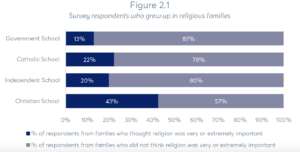A survey of 25 to 39 year olds reveals their views on the Bible, church and faith
Just maybe millennials are more religious than you thought
A landmark survey of Australians aged 25 to 39, who finished their secondary education between 1998 and 2011, reveals their attitudes to faith, church attendance and family issues.
The Cardus Education Survey with a substantial sample size of 4913 was commissioned by a consortium of six “Christian” school networks.
It teases out the differences between graduates from different sorts of schools such as Government, Catholic, and Independent, as well as the schools from the six networks (generally founded in the last 50 years, and are styled “Christian” in the survey).
Eternity covered the main findings of the report regarding different sorts of schools in this earlier story. In this follow-up story, we will dig into the survey’s faith findings – and add the overall results for the 25 to 39 year olds which we calculate on the proportions of graduates from the school sectors, based on the methodological paper from Cardus.

Overall, 17.2 per cent of respondents came from families who thought religion was extremely or very important. By school, the results were 43 per cent for Christian schools, 22 per cent for Catholic, 20 per cent for Independent and 13 per cent for Government.
This survey provides good evidence of how many people in the 25 to 39 age group say they are Christians – 62 per cent of Catholic school graduates, 58 per cent from Christian Schools, 43 per cent from Independent Schools and 33 per cent from Government schools stated they are Christian.
This gives an overall result of 42 per cent for this age group.
“Christian” in this response to the survey means people who identified their religion as Catholic, Anglican, Uniting Church, Presbyterian and Reformed, Eastern Orthodox, Baptist, Pentecostal, Lutheran, Seventh day Adventist, Oriental Orthodox, Salvation Army or Churches of Christ.
20 per cent of millennials surveyed are members of a church or religious association, with 45 per cent coming from Christian School attenders, 25 per cent from Independent schools, 24 from Catholic schools and 16 per cent from Government schools.
While each of the school sectors reported between 60 and 70 per cent of attenders having donated to a not-for-profit or charity during the past 12 months, there was a wider disparity of responses with donations to a local church, synagogue, mosque or temple. About 45 per cent of Christian school attenders had donated to such a cause, in contrast wtih 27 per cent from Independent Schools, 20 per cent Catholic and 17 per cent Government.
“This pattern highlights the critical role family plays alongside the school in forming young people.” – Cardus Education Survey
Is “God a personal being involved in the lives of people today?” To that question, 45 per cent of Christian school attenders said “yes”, as did 27 per cent from Catholic Schools, 24 per cent Catholic and 19 per cent Government. The overall figure was 23 per cent.
Those who believe “God does not exist” amounted to 35 per cent of Government School attenders, 26 per cent from Catholic schools, 25 per cent from Independent Schools and 12 per cent from Christian Schools. Overall, 31 per cent did not believe God exists.
Lower percentages believed “God created the world but is not involved in it now”. Only 11 per cent of Christian School attenders beloved that, joined by 9 per cent from Independent schools, 5 per cent from Catholic schools and 4 per cent from Government Schools, with an overall percentage of 5.
Asked if they had attended a religious service during the past 12 months, 67 per cent of the Government school sample said “never”. They were joined by 54 per cent of the Catholics, 53 per cent of the Independents, and 35 per cent of the Christian school sample. That gives an overall result of 59 per cent.
Asked if they had “engaged with a religious text” during the past 12 months 77 per cent of the Government school sample said “never”, joined by 71 per cent of the Catholics, 59 per cent of the Independents, and 39 per cent of the Christian school sample. The overall “no” percentage is 72 per cent.
The survey notes that it controlled for “religiosity” of families, these “cross sector differences declined dramatically”.
“This pattern highlights the critical role family plays alongside the school in forming young people.”



